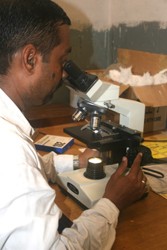
Sabiha thought she had typhoid or malaria when she went to a Karachi hospital two years ago with a hacking cough, fever, and loss of appetite. When doctors showed her an x-ray of her ravaged lungs, the 16-year-old panicked. She had tuberculosis. Relatives taunted her family, saying they would never be rid of the disease. “People act strange when you tell them of this disease. They avoid you. They need to be told there is a cure,” said Rukhsana Parveen, a Karachi woman whose husband had TB and is now cured. “If they knew, they wouldn’t behave this way.”
TB remains Pakistan’s leading cause of death among infectious diseases. It carries a social stigma because of its link with poverty and overcrowded living conditions. Every year, at least 250,000 Pakistanis develop TB, a bacterial infection that spreads through inhalation and primarily affects the lungs. Left untreated, it eats away at bones and organs. Hobbled by poverty, shame, or lack of awareness, three-quarters of those infected are never diagnosed by a doctor. Since 2003, USAID has contributed nearly $5 million toward Pakistan’s National Tuberculosis Control Program, supporting free diagnostic sputum tests, medication, and training for community health workers to supervise patients through home visits.
Government health centers now teach community workers to identify TB symptoms during regular house calls, bring suspected patients into nearby health centers for diagnosis, ensure patients take their medication during the 8-month treatment course, and encourage community awareness. Involvement in a patient’s course of treatment is critical because, like Sabiha, most registered TB patients stop medication prematurely. As symptoms disappear, they lose the will to continue treatment — it requires discipline, is expensive, and can be socially embarrassing. As a result, drug-resistant TB bacteria can return. Initially treated at a private clinic, Sabiha stopped her drug treatment two months early, unable to afford the 550 rupees ($9) a month. Soon her symptoms returned. For the next year, Sabiha suffered silently as the pain in her lungs and ribs worsened. Finally, she learned of a public USAID-supported treatment program a short bus ride from home. Now 18, Sabiha is improving slowly from her long bout with TB. As she recovers, she is hopeful that a long, healthy life awaits her.







Comment
Make a general inquiry or suggest an improvement.